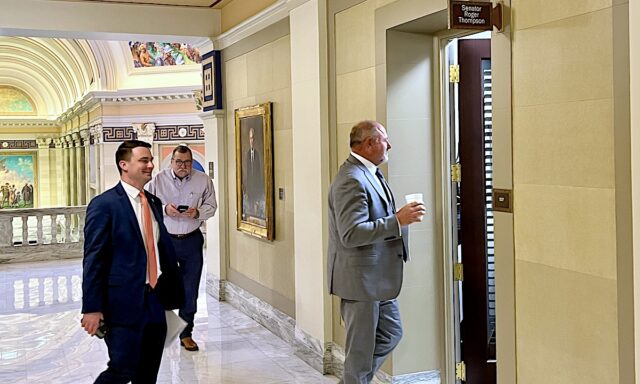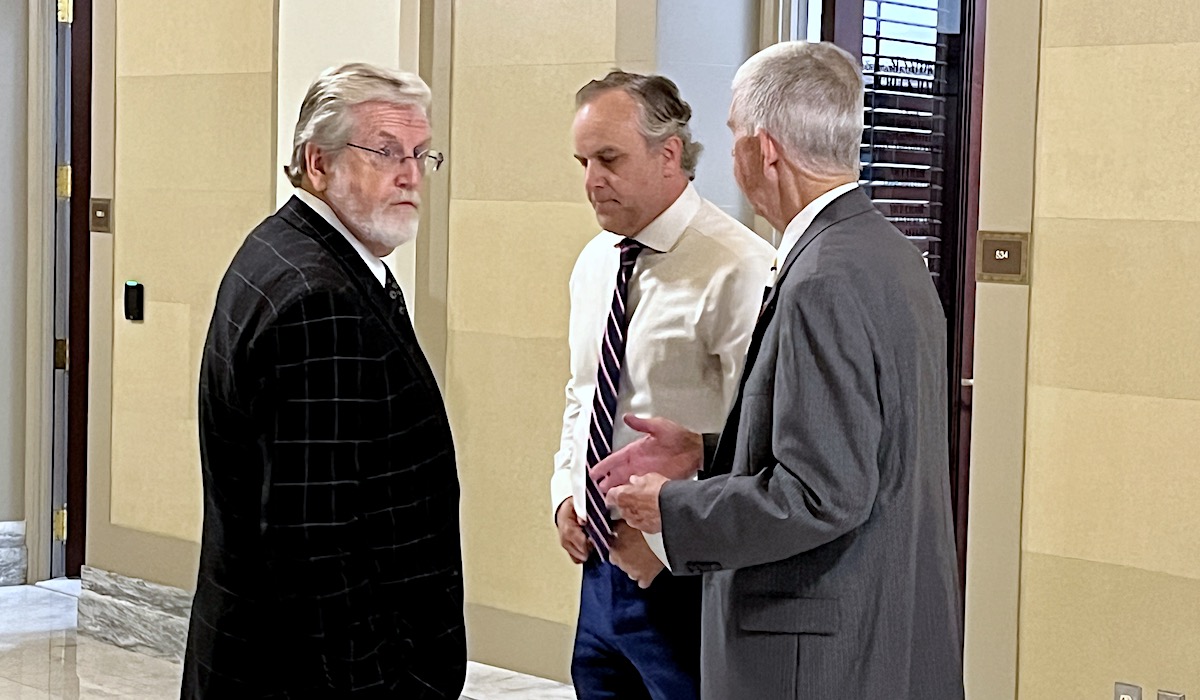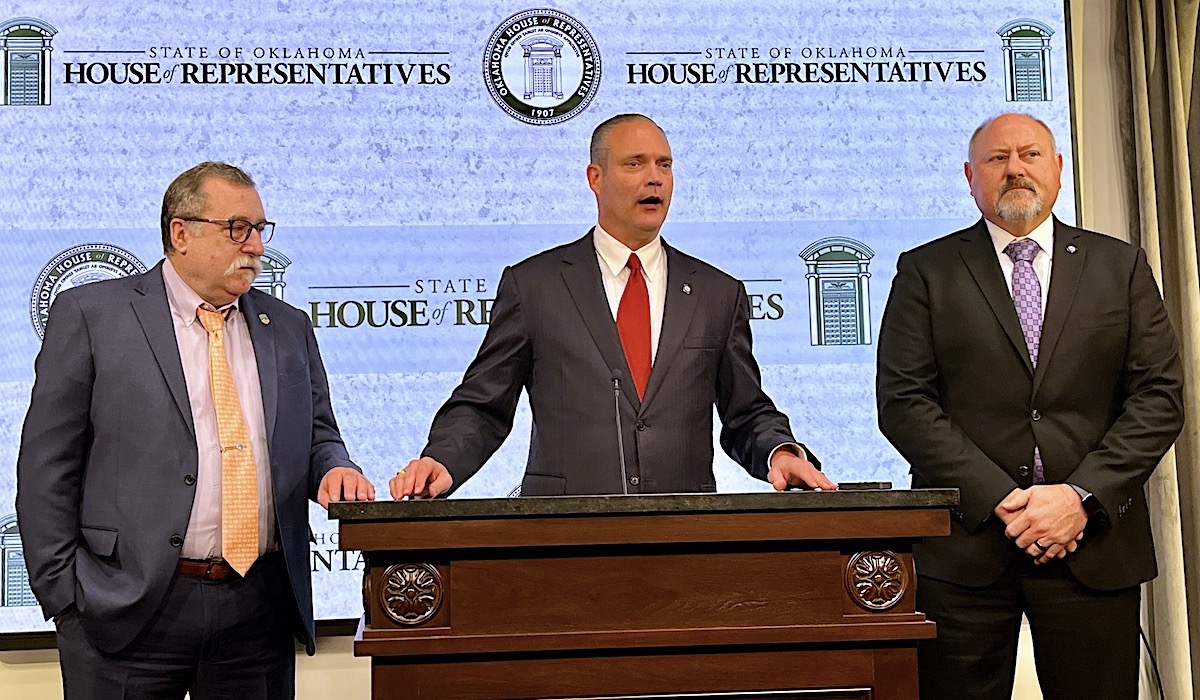
(Update: About two hours after the publication of this article, Senate President Pro Tempore Greg Treat announced that he had removed Sen. Roger Thompson from the position of chairman of the Appropriations and Budget Committee, and the Wednesday meeting of the committee was cancelled. The article below remains in its original form.)
Leaders of the Oklahoma House of Representatives said Monday they could strike a state budget agreement with their Senate counterparts by the end of the week, but lingering tensions between the upper chamber and Gov. Kevin Stitt could complicate the remaining month of session.
Meanwhile, Senate Appropriations and Budget Committee Chairman Roger Thompson (R-Okemah) urged observers to pump the brakes on the House’s prognostication.
“I would not say we are that close. We’ve got some details that we are going to have continue to talk about, and those are the ones where we want to make sure we do it all in public,” Thompson said Tuesday. “We’ve still got a lot of work to do.”
With a slate of agency appropriation agreements added last week to the “change log” of the Legislature’s new budget transparency portal, a handful of unsettled budget discussions remain, including:
- A 0.25 percent income tax rate cut championed by Stitt, passed by the House, but opposed by Senate leaders;
- Whether to fund $20 million for the governor’s Quick Action Closing Fund and $10 million for marketing activities related to state business recruitment;
- How to handle a proposed $350 million investment toward deferred maintenance projects at state parks, state-owned buildings and higher education institutions;
- Whether and how to fund $125 million in local water projects;
- Whether to increase appropriations to the House and create per-member funding parity for the Legislature’s two chambers;
- Common and higher education appropriations for Fiscal Year 2025, and a lingering dispute over how to rectify a school district funding gaffe in Fiscal Year 2024.
“I really hope to get a budget deal done this week. We’re at the point where I think we’re very close,” House Speaker Charles McCall (R-Atoka) told media Monday. “There’s only [a few] areas of the budget where there’s not agreement on, so hopefully we can work through those and hopefully the Senate will make it a priority this week to get those addressed.”
In an interview minutes later, House Appropriations and Budget Chairman Kevin Wallace (R-Wellston) outlined the six sticking points listed above.
“I’m really hopeful we’re going to get a budget deal this week, but it will require everyone getting in a room and just getting it done,” Wallace said. “If we would have been able to get everybody in the room, we could have gotten a deal last week.”
Late Monday, Wallace, other House negotiators and Senate leaders crowded into Thompson’s conference room in pursuit of resolutions for education disagreements.
“We were just kind of working on some education numbers yesterday and trying to put everything together before we have an appropriations meeting tomorrow so the public can stay in tune with where we are,” Thompson said Tuesday. “We are working on flex benefits for Career Tech. What is that number? Their original request had $1.5 million, they modified that to like $3 million. So we’re just doing some paperwork on that.”
At the Senate Appropriations and Budget Committee meeting set for 10 a.m. Wednesday, Thompson said senators “will reveal everything we have up until this point.”
But pointing to the updated budget portal on the House website, Wallace noted that he and Thompson can only iron out so much of the legislative linen themselves.
“It will come down to McCall, Treat and Stitt on the last couple of items,” Wallace said. “I’m sure that tax cut, the governor’s request on his closing fund and marketing the state — that will be a principle decision.”
One year later, 2023 drama still on many minds

How those decisions and conversations unfold between McCall, Stitt and Senate President Pro Tempore Greg Treat remains to be seen, but drama from last year’s final negotiations has lingered in the State Capitol like stormwater in a leaky tunnel.
During his media availability last Thursday, Treat (R-OKC) said he believes Stitt hates him, referencing a dozen or so Senate measures that the governor had vetoed this session compared to fewer than half a dozen House bills that had received the executive axe.
“There seems to be a pattern emerging. My grandmother used to have a phrase that said, ‘Even hypochondriacs get sick every once in a while.’ So I may just be paranoid, but I believe where there’s paranoia sometimes there is a real reason for it,” Treat said. “You know the governor last year vetoed arbitrarily about 20 of our bills that caused us to (…) deny a couple of his executive [nominations]. It seems like he may be heading down that same wrong-headed path, but we’ll watch and see and make sure he’s doing it on the merits of his disagreement on policy and not just trying to target myself or the Senate at large. It seems like he is also targeting [Attorney General Gentner] Drummond in a lot of his vetoes. So I just want to serve notice that we’re watching.”
At his own media availability the next day, Stitt said he pays no attention to whether bills he vetoes originated in the House or the Senate. But in a subsequent interview hours later, he acknowledged that he intended his 2023 massacre of “unrelated” Senate bills — which had occurred exactly one year ago to the day — as pressure for Treat and others to strike a school-choice tax credit agreement.
“That was just something I had to do to get their attention, and the House was fully in support of that, and as soon as we got that done, guess what? They wrote the school-choice bill, and we got it across the finish line. So that was great, and we moved on,” Stitt said. “Obviously if we did that this year, I would let everybody know. But the bills that we’ve vetoed this year had nothing to do with — they were bad policy.”
Informed of the wisdom Treat attributed to his grandmother, Stitt said 2024 is not 2023.
“He’s seeing ghosts if he thinks we’re doing that,” Stitt said, starting to laugh. “That’s funny he said even a hypochondriac gets sick. That’s pretty funny.”
But Treat has been more bemused than amused about his deteriorated relationship with Stitt, which he said “kind of devolved last April or May.” Since then, he said they have shaken hands at a couple of events, but nothing more.
“I think it’s a personal hatred of me,” Treat said, revealing details of a May 2023 meeting among legislative leaders and Stitt in the governor’s conference room. “He was going over every item of the budget and nitpicking on it, and I loved it, because he was nitpicking Kevin Wallace’s pet projects, and I was like, ‘Yeah, I’d love to get those out, too.'”
Treat said Stitt’s attention turned to Joint Committee on Appropriations and Budget bills to extend tobacco and motor vehicle compacts with tribal nations, which ultimately resulted in a summer of special session stress and strain.
“The speaker had done a five-year extension on the compacts without my approval — put my name on something,” Treat said. “I said I was only willing to give a one-year extension on the compacts because I wanted to give both the governor and the tribes a probationary one-year period to see if we could get [deals done], and for some reason that really stuck in his craw, and I don’t know what it was. He got really upset at me, and I could never understand it.
“For some reason, all the anger came to me, and it’s never been the same.”
Stitt said Friday that he does not hate Treat.
“If we have disagreements with each other, apparently it’s around should we cut taxes or not,” Stitt said. “There may be a philosophical difference between myself and Sen. Treat, but I hope it’s not personal. It’s certainly not personal for me.”
Wallace, however, also caught the shade from Treat’s story. The “pet projects” derided by Treat included a new self-financing fund for state building projects, a proposed judicial evaluation program (that stalled) and a $265 million appropriation for the Oklahoma Housing Finance Agency to create new housing incentive programs. Legislators ultimately reduced the housing program to only $215 million following the meeting with Stitt.
“That’s called negotiations. I negotiated to reduce $50 million to make sure the governor wouldn’t veto it. It was a statewide need,” Wallace said of the housing programs. “[Treat] said, ‘Wallace’s pet projects?’ That’s funny. There was also a senator’s name on the bill.”
Wallace said he was in the meeting where Treat and Stitt’s relationship apparently soured, but he smiled and stopped short of discussing how the conversation unfolded.
“They can express their positions on what did or didn’t happen,” Wallace said.
Follow @NonDocMedia on:
Facebook | X | Text or Email
Other issues include water project administration, mental health hospital funding gap

While Wallace chose not to weigh into the boiling beef between Treat and Stitt, he did describe this session’s budget disagreements that are lingering in the Legislature.
Among those is House concern about the details of a Senate proposal to send the Oklahoma Water Resources Board an additional $125 million for local water system grants. OWRB received $380 million in American Rescue Plan Act funding last year for water projects, and with implementation unfolding slowly, the agency has earned $12.6 million of interest on that money over the past year.
Meanwhile, Wallace said, the Department of Environmental Quality spearheads engineering, inspections and permitting for those local water projects, and he said that agency’s fees have not kept up with the costs incurred. In one instance, Wallace said, statute lets DEQ charge $500 for a permit that costs $750 to administer.
“Every permit, they’re losing money,” Wallace said. “There’s a conversation about whether or not DEQ should just bill the OWRB for their cost on individual projects or bill the community or the rural water districts or whoever is doing the projects, because the Water Resources Board is letting [the local entities] retain the 4 percent [administrative cost allowance] versus using it for their administrative fees because they are making so much money off the interest right now.”
Meanwhile, he said OWRB’s official budget request includes a litany of needs for increased staffing levels just to administer existing projects.
“They’re way understaffed just for the programs that they have,” Wallace said. “So I’m the one and the House is the one saying, ‘Wait a minute, I know we have a lot of water demands, but putting something at the Water Resource Board right now when they’re understaffed even with the projects they do have and then not being able to get the inspections, the permitting and everything paid for at DEQ — another state agency that is tied to these projects — is problematic.’ So we’re trying to work through this minutia.”
Speaking of minutia and ARPA dollars, a legislative subcommittee of the Joint Committee on Pandemic Relief Funding met Tuesday morning to hear updates from the Oklahoma Department of Mental Health and Substance Abuse Services about the long-anticipated construction of The Donahue, which is slated to become the state’s primary mental health hospital located in central Oklahoma.
While a groundbreaking was held March 28 on the campus of OSU-OKC near Interstate 44 and Reno Avenue, it turns out that inflation-related building cost increases, a $3 million hike in the lease paid to OSU-OKC and a failure to sell the Griffin Memorial Hospital property just east of downtown Norman has caused a $78.6 million funding shortfall for the $175.6 million project.
“That’s a pretty big chunk of money, so I’m concerned,” House Minority Leader Cyndi Munson (D-OKC) said during the meeting.
House Speaker Pro Tempore Kyle Hilbert (R-Bristow) and House Floor Leader Jon Echols (R-OKC) peppered new Commissioner of Mental Health Allie Friesen and ODMHSAS staff with questions about why the Griffin property has not even been listed for sale.
“This $78.6 million number (…) I was unaware of that number until today,” Hilbert said, referencing a separate building project that has received state funding but remains unopened. “If we don’t fund that (gap) this session, it’s imperative we do it next session. We don’t need another Pop Museum like we have in Tulsa here in Oklahoma City that is just sitting half-empty waiting for the rest of the funding.”
The Donahue’s original construction budget included anticipated revenue of $50 million from the sale of the Griffin property, a portion of which has been eyed by some Norman leaders as a potential location for a permanent homeless shelter. In a document handed out by Friesen on Tuesday, the Griffin property sale value was listed as “TBD.”
“The reality that we’re in today is we do not have confidence that we can obtain that amount,” Friesen said.
ODMHSAS staff cited concerns from potential buyers about buildings on the property that include asbestos and lead, and they said DEQ officials told them an abatement grant could only be provided to a municipality like Norman and not to ODMHSAS as a fellow state agency.
Preemptively apologizing for his stern questions, Echols grew irritated by the revelation that pre-pandemic plans to liquidate the Griffin property have not even yielded a public “for sale” sign. He also referenced a U.S. Department of Justice investigation launched in late 2022 about whether Oklahoma has failed “to provide community-based mental health services to people” in a way that leads to “unnecessary admissions to psychiatric facilities and police contact.”
“In all honesty, what are we doing?” Echols asked about uncertainty over the Griffin property’s actual market value. “We could know this answer if we wanted to know.”
After the meeting concluded, Echols and Hilbert said no one should overreact to the situation, but they said it is concerning.
“I think we have a team that can get us there. This was a tough meeting where we asked hard questions, because when numbers change that’s what you do. But we have to get this project done,” Echols said. “To be clear, the federal investigation I referenced is into mental health in Oklahoma. Then we have a lawsuit, obviously, dealing with how long it takes to get restore-to-competency done, and this is a huge piece of getting that done.”
Hilbert said lawmakers knew there was “going to be a gap” on The Donahue project but that “previous administrations” at ODMHSAS had not shown him a specific financial figure.
RELATED
Education negotiations: House proposal flat, Senate seeks staff stipend, other items by Bennett Brinkman
“A lot of the things that we talk about in this building are one year to the next, one session to the next (…) but we’re talking about a century,” Hilbert said. “The Griffin Memorial Hospital has been where it is for over 100 years. Like they said in the meeting, they’ve owned this property since before statehood. This is going to be a century-plus project that is going to outlive all of us, so it’s important that we get it right. I would rather it take a little longer than we initially had hoped that it would than to get it wrong.”
Thompson, the Senate’s budget committee chairman, said a Joint Committee on Pandemic Relief Funding will be Thursday afternoon to discuss the matter further, although no meeting notice has been filed by either the Senate or the House. Hilbert said the meeting is set for 1:30 p.m. in Room 535.
Wallace, meanwhile, said he has been told senators are displeased that he has met with Stitt’s office on budget proposals, such as the Quick Action Closing Fund and marketing dollars requested by the governor, carried on the House’s spreadsheets but — according to Wallace — opposed by the Senate.
“I’ve heard some negativity that the House has met with the executive,” Wallace said. “I’m like, ‘The House is willing to meet with anybody that wants to talk about the budget. You guys just wouldn’t meet with us for seven weeks.'”






















